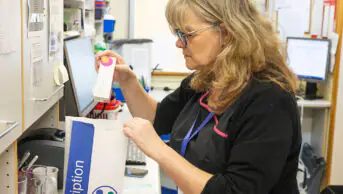
Shutterstock.com
Community pharmacy leaders in Norfolk and Suffolk have secured a £60,000 contract to lead an integration project with local integrated care boards (ICBs) that aims to increase service referrals to community pharmacy.
A letter to pharmacy teams from Community Pharmacy Norfolk and Suffolk (CPNS) announcing the contract with Norfolk and Waveney ICB and Suffolk and North East Essex ICB, dated November 2024, said the project will aim to build “an integrated approach to the implementation and improvement of referral pathways into community pharmacy services, and support the delivery of these services by our pharmacies locally”.
It added that the project will initially focus “on the Discharge Medicines Service (DMS), Pharmacy First, Hypertension Case-Finding Service and Pharmacy Contraception Service (PCS)”.
The letter also said pharmacy contractors will be supported to increase “timely referral acceptance rates and improve completion rates” for each of the services, while also being supported to improve their understanding of primary care network (PCN) priorities “relating to population health needs and the role community pharmacy plays in delivering on those priorities”.
Lauren Seamons, CPNS joint chief officer, told The Pharmaceutical Journal that the external funding had given the organisation the opportunity to understand the barriers to integration by engaging with wider stakeholder groups, such as practice managers and patient participation groups.
Seamons said: “It’s looking at what people’s perceptions and barriers are and then creating solutions for that.
“The outcomes of our feedback and discussions with different groups has been there’s not a wide enough awareness in the public of some of the services we’re doing, like contraception and hypertension, and then there are not necessarily enough pharmacies delivering some of those more complex services consistently, so we need to make sure that we get the supply right before the demand comes.”
CPNS has already started working on ensuring DMS referrals to pharmacies are appropriate, at a sustainable level and that pharmacists are able to respond to them in a timely manner, she said.
Seamons added: “If the service is going to be effective, and it’s an essential service, then we need to make sure that we’re going to put in some support around picking up those referrals and making sure they’re completed to the best stage they can.
“There’s a bit of a misconception around the DMS. If you don’t do all three stages, they often don’t get claimed… if you don’t make that claim, it doesn’t get recognised in the figures as an intervention. So that’s another important strand of what we’re doing.”
In January 2025, CPNS will focus on sharing DMS best practice with pharmacies, including hosting a DMS-specific webinar.
“It’s not about increasing the total number of DMS referrals to pharmacies. It really is about focusing on the quality, the completion rates and making sure that they’re for the right patients. We don’t want to create extra work for the pharmacies, but we do want to make sure that the right patients are using the service and that the trusts see the value of the service,” said Seamons.
In February 2025, CPNS plans to focus on the Hypertension Case-Finding Service, particularly ambulatory blood pressure monitoring best practice and ensuring only the right patients who require intervention are then being sent to GP practices. Seamons said that in March and April 2025, the plan is to offer face-to-face training on PCS, as well as an online session.
A Pharmacy First referral toolkit will also be supplied to GP practices across both ICBs, and CPNS is planning to provide intensive support to “a handful” of practices, to support them to refer to pharmacies.
According to recently published NHS England data, the number of GP referrals to the Pharmacy First clinical pathway service in England has varied widely between ICBs. Norfolk and Waveney ICB had one of the lowest rates of GP referrals. However, an ICB spokesperson said that, while referrals in the area were lower than some areas, verbal signposting was not reflected in the figures.
NHS Norfolk & Waveney ICB and NHS Suffolk & North East Essex ICB said in a joint statement: “We recognise the significant potential of community pharmacy services in supporting plans for recovering access to primary care, and we also acknowledge that local engagement and collaboration are essential to ensure successful implementation.”
“We are confident that CPNS possesses the expertise, capacity and strong partnerships needed to deliver successful outcomes, and we look forward to working together,” it added.
The project will be managed and delivered by the CPNS team’s existing officers, with additional support from former Suffolk LPC chief officer Tania Farrow, and will run until September 2025.


